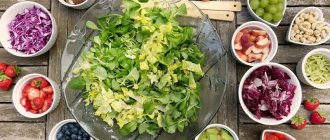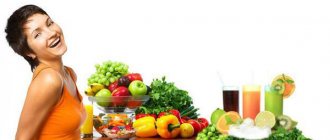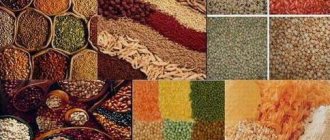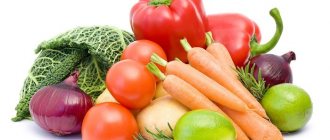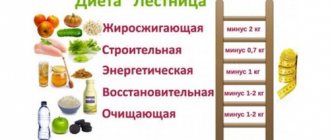Vegetarianism can be a healthy way of eating, as long as you design your diet correctly to give your body all the nutrients it needs. If a vegetarian diet does not contain certain vitamins and minerals, you may develop certain deficiencies that can be detrimental to your health and even life-threatening.
Iodine deficiency
The human body's metabolism is regulated by hormones in the thyroid gland, and this requires that iodine be supplied to the body properly. Iodine is needed for the proper functioning and maintenance of the heart, brain and kidneys. Seafood is the best source of iodine, although it can also be found in dairy products and kelp.
Content:
- Iodine deficiency
- Vitamin B12 deficiency
- Zinc deficiency
- Adverse effects on the digestive system
- The need for meat
- Research data
- Negative effects of vegetarianism on pregnancy
- The dangers of vegetarianism for a child’s body
- The effect of a vegetarian diet on a woman’s body
- Menstrual irregularities associated with hormones
Being a vegetarian, especially one who also excludes dairy, can put you at risk for developing iodine deficiency, which can lead to side effects such as hypothyroidism and goiter.
Contraindications
A vegetarian diet is one of the healthiest ways to eat. However, there are conditions in which strict vegetarianism is contraindicated. These include:
- Iron-deficiency anemia;
- gastritis with high acidity;
- chronic colitis;
- pancreatic diseases.
People suffering from these diseases are advised to combine plant foods with dairy products, eggs or fish.
For women
Some specific features of the female body are also incompatible with strict vegetarianism. With hormonal disorders, plant foods can aggravate the condition. You should use soy products with extreme caution - the isoflavones they contain can cause infertility.
Pregnancy and breastfeeding in themselves are not contraindications to vegetarianism. Many vegetarian women successfully bear healthy children. But for a number of diseases, a strict plant-based diet is contraindicated. Among them:
- recurrent miscarriages;
- serious metabolic disorders;
- blood diseases;
- anemia.
When planning a pregnancy, vegetarians need to undergo a comprehensive examination and consult a doctor.
For men
Disorders of male reproductive health may become a limitation to vegetarianism. With oligozoospermia, the body produces too few germ cells. A diet rich in animal proteins - red meat, eggs, seafood - helps improve the situation. Conversely, soy products reduce sperm production. Even vegetables and fruits have their downsides - non-organically grown fruits contain pesticides that are harmful to male fertility.
Another contraindication to strict vegetarianism is asthenozoospermia, in which the activity of germ cells is sharply reduced. Vitamin B12 is especially important for treatment, of which there is very little in plant foods.
Vitamin B12 deficiency
Vitamin B12 helps the body produce red blood cells. However, with a deficiency of this vitamin, anemia occurs. Other signs of B12 deficiency include numbness, fatigue, diarrhea, nervousness, or shortness of breath. B12 deficiency can go undetected for a long time due to the high amount of folate that a vegetarian diet often contains. Folates may mask the signs of B12 deficiency until more serious symptoms such as neurological damage appear.
History of the development of vegetarianism
The history of the development of vegetarianism goes back to ancient times.
The first mentions of the refusal of meat products were found in Ancient Egypt, and date back to the 4th-5th centuries. BC. The priests switched to a plant-based diet, because... wanted to be closer to God.
One of the world religions, Buddhism, supports vegetarianism. Buddha said that one who strives for a pure life cannot eat the flesh of living beings. Many philosophical movements recommended this form of nutrition to their followers as a way of self-restraint.
The emergence of vegetarianism in Russia is to some extent connected with the activities of Leo Tolstoy. He promoted this food system.
“For 10 years the cow fed you and your children, the sheep clothed you and warmed you with its wool. What is their reward for this? Cut your throat and eat it?!” (Lev Tolstoy) .
Thanks to his activities, lectures on the benefits of vegetarianism began to be held in Russia.
In 1901, the first vegetarian society appeared in St. Petersburg. Since then, more and more people have become vegetarians. Most do this because of moral and ethical convictions.
Zinc deficiency
Without zinc, the immune system cannot function properly, and zinc also plays a key role in cell division and helps your body form proteins. Although zinc can be found in both animal products and plants. The body absorbs this mineral more easily through animal-based foods. Signs of zinc deficiency may include loss of appetite, unintentional weight loss, loss of taste or smell, hair loss, poor wound healing and depression.
Although nutritional deficiencies can be serious, most problems can be prevented quite easily.
For example, you need to consume iodized table salt every day, just 1/4 tsp. contains 95 mcg of iodine, and adults over 14 years of age require 150 mcg of this mineral per day.
Both vitamin B12 and zinc can be found in foods such as fortified breakfast cereals and dairy products.
How to switch to a vegetarian diet
A person must decide for himself whether he should switch to a vegetarian diet. Strict vegetarianism (veganism) is indicated for adults who are practically healthy. Vegetarians additionally need to take balanced vitamin and mineral complexes. Veganism may be contraindicated for children, pregnant women and those with chronic diseases. For these categories, a type of vegetarianism that is lighter in terms of nutrition is recommended (lacto-vegetarianism, lacto-ovo-vegetarianism, flexitarianism or pescetarianism) subject to the recommendations of a nutritionist, taking balanced vitamin-mineral complexes and constant laboratory monitoring.
Based on the foregoing, we can conclude: the decision to switch to vegetarianism (veganism) should be carefully considered, since this food system has negative aspects if the diet is not balanced. It should be varied and supplemented, if necessary, with vitamin and mineral complexes. It is worth carefully studying the information presented in the table, which shows products of plant origin containing essential vitamins, minerals, proteins and essential amino acids necessary for the normal functioning of the body.
Content of vitamins, minerals, protein and essential amino acids in basic plant foods
| Vitamins, minerals, proteins, essential amino acids | Products with the highest content |
| Vitamins | |
| Vitamin A | Red carrots, red bell peppers, tomatoes, pumpkin, apricots, peaches, melons, plums, greens (parsley, sorrel, spinach, green onions, wild garlic, green lettuce), rowan berries, blackberries, currants, walnuts, apples and oranges. However, plant foods contain less vitamin A than animal products. |
| Vitamin B1 | Buckwheat, oatmeal, nuts, wholemeal bread, rice bran, sprouted wheat, vegetables (mostly green), legumes, some fruits and berries, garden herbs, wild herbs (burdock, nettle, clover), brewer's yeast, algae |
| Vitamin B2 | Nuts (primarily peanuts and almonds), cereals (rolled oats, rice, buckwheat), vegetables (primarily green), legumes (especially lentils, beans and peas), fruits (the largest amount in apricots), greens (most in parsley, nettles, dandelion leaves and green onions), mushrooms |
| Vitamin B3 | Mushrooms (ceps, champignons), nuts (peanuts, pistachios, hazelnuts, walnuts), legumes (beans), cereals (oatmeal, wheat, barley), vegetables (corn, broccoli, potatoes, carrots, tomatoes, sorrel) , coffee |
| Vitamin B5 | Vegetables, brewer's yeast, legumes, grains, nuts, mushrooms, royal jelly, whole wheat, whole rye flour |
| Vitamin B6 | Sprouted grains, potatoes, peas, cabbage, carrots, tomatoes, beans, lentils, soybeans, leafy green vegetables, many cereals and cereals, yeast, nuts, seeds, berries and fruits (many vitamins in bananas), herbs (alfalfa) |
| Vitamin B12 | Food products are actually only of animal origin. Available to the human body is not found in plant foods |
| Vitamin C | Fruits and berries (all citrus fruits, kiwi, apples, peaches, apricots, strawberries, black currants, melon, persimmons, rowan berries, raspberries, blackberries, rose hips, sea buckthorn), vegetables (cabbage, green leafy vegetables, green peas, bell peppers, tomatoes , beets, carrots, onions, new potatoes), herbs (burdock root, alfalfa, hops, eyebright, fennel seed, peppermint, parsley, nettle, sorrel) |
| Vitamin D | There is practically no vitamin D of plant origin in products. It is found in very small quantities in oatmeal, parsley, potatoes, alfalfa, dandelion greens, and nettles. |
| Vitamin E | Vegetable oils, nuts, whole grains, seeds, spinach, broccoli, carrots, oatmeal, cucumbers, potatoes, radishes, green leafy vegetables, onions, herbs (alfalfa, nettle, dandelion, rose hips) |
| Vitamin K | Green leafy vegetables, green tomatoes, all types of cabbage (especially broccoli), soybean and olive oil, walnuts, herbs (nettle). Vitamin K is found in small quantities in avocados, kiwis, bananas, cereals and bran. |
| Folic acid | Leafy green vegetables (green salad, parsley, cabbage, green tops of many vegetables), legumes (peas, beans), vegetables (beets, cucumbers, carrots, pumpkin), cereals, fruits (bananas, oranges, apricots). |
| Minerals | |
| Potassium | Vegetables (potatoes, cabbage, tomatoes, beets, celery root), fruits (apples, pears, bananas, oranges), grains (rye, wheat, oats, rice), legumes (peas, beans), mushrooms |
| Sodium | Vegetables (potatoes, cabbage, pumpkin, cucumbers, tomatoes, carrots), fruits (watermelons, melons, apricots, plums, grapes, bananas, oranges), grains (rye, wheat, oats, buckwheat), nuts (almonds, walnuts, pine nuts, peanuts, cashews), dried fruits |
| Calcium | Legumes (beans, peas), nuts (almonds, pistachios, hazelnuts, walnuts), cereals (oatmeal, barley), garlic |
| Phosphorus | Legumes (especially green peas), nuts, pumpkin seeds, vegetables and fruits (cucumbers, cabbage, pears, apples), cereals, dried fruits, yeast, bran, garlic |
| Magnesium | Pumpkin seeds, sunflower seeds, sesame seeds, pine nuts and walnuts, chocolate, cocoa powder, lentils, beans, sprouted wheat seeds |
| Zinc | Sea kale (kelp), vegetables (beets, tomatoes, garlic, ginger), legumes, wheat germ, wheat bran, sunflower seeds, pumpkin seeds, corn, fruits and berries (raspberries, blueberries, oranges) |
| Iron | Iron can be of several types: heme (in animal products) and non-heme (in plant products). Non-heme iron is less easily absorbed. Large amounts of non-heme iron are found in bread, cereals (buckwheat, oatmeal, barley, rye, wheat bran, corn), vegetables (cauliflower, broccoli, beets), greens (spinach, asparagus), legumes (beans, beans, lentils, peas). ), fruits and berries (pomegranate, plum, persimmon, apples, dogwood), nuts (pistachios, cashews, almonds, peanuts, walnuts), pumpkin seeds, sunflower seeds |
| Squirrels | |
| Protein | Legumes (soybeans, beans, peas, lentils), nuts (peanuts, sunflower seeds, hazelnuts, almonds, walnuts), cereals (buckwheat, millet, rice, oats, semolina), broccoli, spinach, mushrooms |
| Essential amino acids | |
| Phenylalanine | The natural form of the amino acid is found in large quantities in soybeans, nuts, seeds, beans, cereals, mushrooms, parsley, figs, dried apricots, bananas, Jerusalem artichokes |
| Lysine | A sufficient amount is found in soy, nuts, lentils, and cereals. Small amounts - in beets, white cabbage, carrots |
| Threonine | Mushrooms, sesame, lentils, cereals (rye, buckwheat, barley) |
| Methionine | Sesame seeds, nuts, peas, beans, lentils, soybeans, brown rice, corn and wheat flour, wheat sprouts, pasta, cereals (oatmeal, millet, buckwheat, pearl barley, semolina) |
| Valin | Plant foods are not so rich in valine; nuts, sunflower seeds, parsley, and cocoa contain sufficient amounts of it. |
| Leucine | Soybeans, peanuts, wheat germ, almonds, oats, beans, beans, lentils, chickpeas, corn, rice |
| Tryptophan | Cereals, legumes (soybeans, beans, peas), nuts (peanuts, almonds, cashews, pine nuts, pistachios), seeds, cocoa beans |
| Histidine | Large amounts - in wheat, soybeans, rice, peas, walnuts, peanuts |
| Isoleucine | Soybeans, lentils, buckwheat, rye, chickpeas, grain bread, almonds, cashews |
First of all, before switching to a vegetarian diet, it is recommended to conduct a laboratory examination to assess the general state of health, determine the concentration of the most important substances for the body, vitamins and minerals. For convenience, you can use diagnostic complexes available for ordering in the LAB4U online laboratory, such as: “Annual examination” “Mineral metabolism”.
It is best to discuss the results obtained with your general practitioner or family doctor. Based on your medical history, examination, and test results, your doctor will determine whether you have medical contraindications to vegetarianism and how strictly you can adhere to a vegetarian diet. This is possible in the presence of certain diseases.
It would be a good idea to consult a nutritionist for advice and develop a nutrition plan, taking into account the results of medical and laboratory examinations. He will also recommend nutritional supplements and vitamin-mineral complexes.
Adverse effects on the digestive system
Plants contain both soluble and insoluble fiber, but the fiber is actually indigestible.
Too much of it can cause the following side effects:
- spasms;
- bloating;
- malabsorption syndrome;
- accumulation of toxic substances;
- constipation and other discomfort.
You need enough water to move the volume of these fibers through the digestive system, because all this can lead to intestinal blockage.
Many grains and wheat in particular contain insoluble fiber, which can increase intestinal discomfort. Humans also have a much shorter digestive structure than herbivores and do not have specialized organs for digesting cellulose, the main fiber in plants.
Lack of vitamins and microelements. There is a solution!
Adherents need to remember which elements deficiency may threaten their health.
Omega-3 fatty acid deficiency
Vegetarians consume omega-6, 9 fatty acids in sufficient quantities with vegetables and vegetable oils. Omega-3, on the contrary, is found mainly in products of animal origin - fish, seafood, eggs.
To avoid omega-3 deficiency, it is recommended to include flaxseed oil, soy milk, and walnuts in the diet in sufficiently large quantities.
Amino acids
Many people know that the body needs protein , and argue that plant foods also contain a lot of protein. However, it is worth remembering that the body does not need protein itself, but a certain set of amino acids. It is especially important to supply the body with essential amino acids that are not synthesized in the body.
Meat and fish contain a full range of essential amino acids. At the same time, plant sources do not contain them in the required quantity and ratio. How can you replace meat in your diet?
Eat different sources of plant protein: cereals, all legumes (beans, peas, chickpeas, lentils), broccoli, nuts, seeds. A good source of essential amino acids is soy. In addition, good sources of protein are the not yet very common and sometimes expensive ones - quinoa and chia seeds. Chia seeds are also rich in omega-3 fatty acids, which attracts the attention of many vegans.
I recommend paying attention to a store where you can buy high-quality quinoa, as well as products made from it at an affordable price .
The selection of chia seeds here is also great.
Vitamin B12
It is found only in products of animal origin - meat, milk, fish, eggs. Vegetarians, especially vegans, usually know about the need to take care of a regular supply of this vitamin. Otherwise, vitamin B12 reserves will gradually be depleted, and health will begin to deteriorate.
Thus, it is recommended to consume foods artificially enriched with B12. Seaweed and wheat germ are also a source of vitamin, it is advisable to add them to your diet.
Remember to monitor your B12 levels and take vitamins if necessary.
Calcium
Dairy products are the main source of calcium. You can replace it with soy, nuts, broccoli, orange juice. You may need to take calcium supplements.
Iron
By far the best source of iron is animal products. Legumes, wheat, pears, spinach, and broccoli seem to contain a lot of iron, however, it is absorbed very poorly. The reason is a different structural form.
Solutions:
- take industrially iron-fortified foods;
- Take iron supplements along with foods rich in vitamin C.
Zinc
The situation is the same as with iron; it is poorly absorbed from plant foods. We won't go deeper. Most likely, you will have to take extra.
Vitamin D
It is synthesized in human skin under the influence of the sun. To do this, it is enough to irradiate the skin of your hands and face every day for 10–15 minutes.
At the same time, vitamin D intake from food is necessary. The main source is fatty fish and seafood. For vegetarians, doctors recommend vitamin-enriched foods, as well as soy.
The need for meat
Meat brings a huge amount of benefits to the human body, and by excluding it from their diet, vegetarians also expose themselves to the lack of essential substances that cannot be obtained from plants:
- creatine – creates energy reserves in muscles and brain tissue;
- carnosine is an antioxidant that protects against degeneration;
- DHA and EPA (active forms of omega-3) convert ALA (plant omega-3) into the active form;
- Vitamin B12 helps synthesize DNA, prevents certain types of anemia, and promotes healthy nerve cells;
- protein with high biological value, which is easily absorbed by the body.
Pros of vegetarianism
- More long-lived people.
- They suffer from cancer less often.
- They are 2 times less likely to be susceptible to coronary heart disease.
- 60% less susceptible to infectious diseases.
- 40% less susceptible to cerebrovascular diseases.
- Lower blood cholesterol levels.
- They do not suffer from diabetes or obesity.
- Gout, arthritis and kidney disease occur less frequently.
The benefits are, of course, great. However, not everyone can get it. All benefits apply mainly to lacto- and ovo-vegetarians. They get animal protein and vitamins from dairy products or eggs (depending on who allows what). Vegans, and especially raw foodists, find it extremely difficult to get everything they need for health and well-being from their diet.
According to doctors, lacto-vegetarianism, and especially lacto-ovo-vegetarianism, does not raise such objections as veganism. It can be recommended for a number of diseases:
- hypertonic disease;
- atherosclerosis;
- obesity;
- pyelonephritis;
- chronic renal failure;
- acute hepatitis or cirrhosis of the liver.
Research data
New research suggests that as well as shedding pounds, reducing cancer risk and increasing life expectancy, vegetarianism may have lesser-known side effects such as panic attacks.
In a surprising discovery last year, Australian researchers found that vegetarians reported being less optimistic about the future than meat eaters.
Moreover, they were 18% more likely to report depression, and 28% were more likely to suffer from panic attacks and anxiety. A separate study in Germany confirms this, finding that vegetarians are 15 percent more likely to be depressed and twice as likely to suffer from anxiety disorders.
Due to the body's incredible ability to adapt, the decline in health due to a vegetarian diet is often slow and gradual.
This can make it difficult to detect these health problems. First, you may not notice the lack of fat-soluble nutrients that the body does not receive (especially retinol and), and that protein deficiency is harmful to health. Because the body will first deplete stored reserves through nutrition, which may take many months or years until nutrient deficiencies lead to detoxification problems, thyroid problems, and/or hormonal imbalances.
In an attempt to increase dietary protein and calories, nuts are often taken to form a larger portion of the diet. But there are serious problems with consuming heavy nuts. Nuts are very difficult to break down, especially for people with low stomach acid. They also contain very high levels of polyunsaturated fats, enzyme inhibitors and include phytic acid, which blocks mineral absorption.
The main advantages of a vegetarian diet
Vegetarianism is often the choice of nutritionists. Plant foods fully provide the body with valuable substances - vitamins C and E, folic acid, magnesium, fiber. Vegetarians get easily digestible proteins from legumes, and unsaturated fats from seeds and nuts.
Here are 7 more important advantages of a vegetarian diet:
- Normalization of metabolism. A diet without animal proteins and fats prevents the development of obesity and diabetes. Cardiovascular support. Eating a plant-based diet reduces bad cholesterol levels, preventing strokes and heart attacks.
- Good digestion. The abundance of fiber normalizes the intestinal microflora necessary for the proper functioning of the digestive tract.
- Improved skin condition. Vitamins contained in vegetables and fruits increase skin elasticity and prevent the formation of acne.
- Eye health. Plant foods are rich in substances that are beneficial for vision - carotene and lutein. Increased life expectancy. By excluding meat foods, a person protects his body from toxins that cause early aging.
- Reducing the risk of cancer. Vegetables and fruits are rich in antioxidants that prevent the growth of cancer cells. An important point is that only a classic vegetarian diet brings benefits, without baked goods, sweets and semi-finished products.
Negative effects of vegetarianism on pregnancy
If you approach vegetarianism wisely, it will not have bad consequences for pregnancy. However, if a woman is not accustomed to a vegetarian diet, or is not getting the full balance of nutrients, then problems may arise with the woman herself, or with her baby. One of the most common problems with vegetarianism during pregnancy is the lack of protein.
Protein deficiency during pregnancy will weaken the mother and can lead to developmental problems in the fetus.
Make sure you get your protein from a range of sources, including grains and legumes. Otherwise, you may miss out on the full range of essential amino acids needed to create new proteins in the body. Doctors say pregnant women should try to get 71 grams of protein in their last two trimesters.
Lack of iron during pregnancy can contribute to weakness and lethargy. In severe cases, it can lead to low birth weight and cognitive problems in children. Iron is found in high doses in meat and fish. However, some plant foods contain iron, although it tends to be in a less easily absorbed form called non-heme iron. The Office of Dietary Supplements suggests pregnant women get 27 milligrams of iron from their diet per day. For example, soybeans contain 8.8 milligrams of iron per 1 cup, and 1/2 cup of cooked spinach contains 2.3 milligrams. Some grains and other foods are fortified with iron.
The male developmental defect hypospadias means that the penis has an abnormal opening to the urethra. In a 2000 study published in BJU International, researchers found that high levels of phytoestrogens consumed in a vegetarian diet may play a role in increasing the risk of hypospadias. They found that vegetarian mothers were more likely to have a child with hypospadias. Other studies suggest that high soy intake may play a role in hypospadias, notes VeganHealth.org.
Pros and cons of vegetarianism. And how I lived without meat for 10 years
In this article “vegetarianism: pros and cons”, I will not only rely on scientific research, but also on personal experience. I haven’t eaten meat products, including fish and eggs, for exactly 10 years. Didn't eat meat at all. Today we will analyze the myths and fears regarding meat and plant foods.
I will also not call for anything. I will try to present this material as objectively as possible. After reading this short article, everyone will draw their own conclusion. It's up to you to decide.
Vegan and vegetarian - what's the difference?
So, we have heard different things about the dangers and benefits of vegetarian food. Some even have vegetarian friends in their circle. With all this, everyone has their own experience. I know many people who have not eaten meat for 25-30 years. I am also well acquainted with those who, after two years of giving up meat, from an energetic and beautiful person turned into lethargic and emaciated.
Let's get straight to the point and clarify something for understanding. There are three types of vegetarians:
- Vegan . Symbol. However, this type includes those who do not eat meat, fish, eggs and all dairy products. There is even honey.
- Vegetarian . Eliminates all meat and fish products from his diet. Including an egg. At the same time, all dairy products are included in the vegetarian diet.
- Lacto-ovo vegetarian. The most gentle side of vegetarianism is when a person, in addition to dairy products, includes an egg and sometimes fish in his menu.
From this gradation, we immediately partially answer the question of why vegetarianism is only a plus for some, and a big minus for others.
There is a huge gap from a vegan to a person who includes eggs or fish in their diet. The difference between a vegan and a vegetarian is significant.
We will examine this nuance in more detail further. You will discover a lot of interesting things. Now let's move on to the advantages of vegetarian food. Then to the disadvantages of vegetarianism.
Pros of vegetarianism
Impact on appearance and emotional state
- Vegetarians definitely look younger than their age. The older you are, the more noticeable the difference.
- In general, life expectancy is higher than that of a person who regularly consumes meat products. (We all know the benefits of the Japanese or Mediterranean diet)
- Vegetarians are more stable and balanced in their emotional state.
Beautiful, but always hungry?
Impact on human health
- With a vegetarian diet, the human body is saturated with useful substances such as omega-6, fiber, carotenoids, folic acid, vitamin C, and other types of important vitamins.
- Feeling better, lightness appears.
- The musculoskeletal system is healed, salts are removed from the joints, which leads to a reduction in the symptoms of diseases associated with the bone structure until its complete restoration.
- It is easier to maintain a normal weight level.
- Blood pressure is lower. This is less likely to cause hypertension. And in general, the pressure is stabilizing.
- A vegetarian lifestyle is very beneficial for the digestive system, since plant foods allow the blood to circulate freely, carrying nutrients to the body tissues, the delivery of which was previously more difficult.
- It has been proven that vegetarians suffer less from various types of cancer and also significantly reduce the risk of developing type 2 diabetes. A vegetarian diet also reduces the risk of heart disease.
Of course, these are not all health-related benefits. We have listed the most common ones. Now let us present the arguments against vegetarianism.
Disadvantages of vegetarianism
- Almost complete absence of vitamin B12 . This vitamin is extremely important for the health of the brain, nervous system, DNA synthesis and blood cell formation. Its use is extremely important at any age. Even a slight deficiency of it leads to a decrease in a person’s mental abilities and chronic fatigue.
- With a lack of vitamin D, the growth and development of a child (even an unborn one) is disrupted, which causes anemia, rickets and other diseases associated with inferiority. Adults experience hair loss and teeth loss. Bones become more fragile.
- Copper, zinc, potassium and iron have lower digestibility.
- Plant foods are low in Omega-3
- In general, vegetarian food requires more effort in preparing it.
Since our topic is vegetarianism: pros and cons, I am obliged to bring to your attention:
Open letter to the Association of Vegans and Medical Professionals
This appeal was recorded on video. For convenience, below I am attaching the text from this video, but in an abbreviated form, if only the essence is important to you.
Recommendations for use of b12
The only reliable vegan sources of B12 are foods that are artificially fortified (including plant milks, several soy products, and breakfast cereals) and supplemented with B12. Whatever the source of B12, be it dietary supplements, artificially fortified foods, or animal products, vitamin B12 is produced by microorganisms.
Most vegans consume enough B12 to avoid anemia and poor nervous system function, but many do not consume enough to prevent the potential risk of heart disease and complications during pregnancy.
To reap the full benefits of a plant-based diet, vegans should follow these guidelines:
- Eat B12-fortified foods that contain at least 3 micrograms of B12 per serving 2–3 times daily.
- Take 10 micrograms of B12 daily.
- Have 2,000 micrograms of B12 in your diet weekly.
If you expect to get B12 exclusively by consuming foods artificially fortified with vitamin B12, then carefully monitor the information on the food label to ensure that the content meets the minimum recommended dose. For example, if a plant-based milk contains 1 microgram per serving, then drinking three servings of that milk throughout the day would be sufficient. Many people find it more practical and economical to take B12 in tablets.
The less often you use B12, the higher the dose you need; small but regular doses are better absorbed. The above tips take this factor into account. There is no risk from exceeding recommended doses, or from combining the B12 supplementation methods listed above.
This message was written by Stephen Walsh, administrator of the Vegan Society, and other members of the scientific committee of the International Vegetarian Union (IVU-SCI) in October 2001.
Vegetarianism: pros and cons. All the salt is in the nuances
Above I offered the material as is. Next we will move on to a simple analysis of the above. After all, supporters of meat cuisine give their arguments “for and against”, and vegetarians give their arguments in favor of vegetarianism.
So, there are always subjective and objective aspects to any question. Vegetarianism: pros and cons is no exception.
We have already touched upon the issue that there is a fundamental difference .
And here attention!
Analyzing the very first and main disadvantage of vegetarianism, namely the impossibility of obtaining the important vitamin B12 from plant foods, a very important point is missed. What does it consist of?
What foods contain vitamin B12 with a daily requirement of 3 micrograms.
Vitamin B12 content in foods
From this table it follows that by consuming 100-150 grams of beef per day or just 100 grams of cheese (cottage cheese) plus a glass of kefir or milk, we are provided with the daily requirement of B12.
Therefore, vegans, not vegetarians or lacto-ovo vegetarians, are at risk as described above.
Why don't vegans eat dairy? In their philosophy, this is a product of some kind of violence against animals. I don't agree with this. However, today we have a different topic =)).
Also scientifically and fairly:
Vitamin B12 is a microbe (bacterium) that is produced by microorganisms and has neither animal nor plant origin.
We owe the fact that we cannot always provide ourselves with the vitamin ourselves to meat-eating - it was thanks to it that the natural mechanisms for the formation of the vitamin by the intestinal microflora were undermined due to the beginning of external B12 entering our body with the flesh, when a person switched from a predominantly plant-based diet to an animal diet. Fortunately, as we see, even over millennia of meat-eating, the mechanism has not been completely lost.
That is, our body partially produces vitamin B12 on its own in our intestines and stomach.
Taking into account the above advantages, these are all serious arguments in favor of vegetarianism.
Vegetarianism: pros and cons. Where can a vegetarian get vitamin D?
Let's turn again to scientific facts. What is the daily requirement for vitamin D?
Where and in what foods is vitamin D found?
Products containing vitamin D
As we can see, dairy products do not contain enough vitamin D for a vegetarian.
But vitamin D is an element that is formed in the skin under the influence of direct ultraviolet rays. Ultraviolet rays are the best natural source of vitamin D.
For vitamin D standards, it is enough to be in the sun 2 times a week, but for at least 15 minutes at a time.
Based on this, we understand that this vitamin is quite accessible to vegetarians. After all, the required vitamin is available in capsules at any pharmacy.
What about omega-3?
Consider the following table:
Vegetarianism: pros and cons. Omega-3
Everything is clear here without any special comments. Nuts and sour cream are the main suppliers of this element.
As for the large labor costs in cooking, it is a matter of skill and habits. It’s about the same as how learning to drive a car takes a long time and is difficult at first. Then the time spent pays off.
Go ahead. What follows is even more interesting.
Vegetarianism: pros and cons. Structure of the human body
Here we will look at the human body, the carnivore and the plant-eating animal. In order not to take up more of your time than required, I will simply present everything in one table.
Comparison of the human body with carnivores and herbivores. Another argument for vegetarianism"
Everything is very clear. In terms of human incisor teeth, the fact that we have incisors is often an argument in favor of meat-eating. But this argument is also broken by counterargument.
Namely, have you seen the tusks of a rhinoceros, hippopotamus or gorilla? =)). And they exist, and what other ones!
As for the lack of human strength without meat, this is also not entirely clear. After all, buffaloes and elephants do not eat meat. I know bodybuilders who have become vegetarians. They also debunked the myth that vegetarians are physically weak.
But it's not that simple!
We still have other important details on this topic. We have no right to ignore them. Also, we have not yet reached my personal experience of living without meat.
Is vegetarianism good for children and pregnant women?
To be or not to be vegetarian in the family?
Our children do not choose their own food. They take habits from us. At the same time, there is the problem of food additives, taste enhancers, due to which our children become addicted to processed foods, the same hamburgers, and so on. Extreme?
Then where is the golden mean?
Let's turn again to modern science and try to find an answer about the benefits or harms of vegetarianism for pregnant women and children. How much meat protein does a child or adult need per day?
Daily meat consumption
What is 150 grams per day for an adult. Essentially, it's just one cutlet or a small piece of meat. Approximately this portion for 24 hours.
150 grams of meat is all that the Russian Ministry of Health recommends per day
Now we divide this small piece into two and get the recommended amount for the child. How much do we actually eat? How much do we offer in one form or another to our children? At the same time, many children refuse pure meat. Many people prefer meat in sausages. And why? Of course - flavoring additives.
Haven't we gone to extremes ourselves?
Can meat that is stuffed with steroids for rapid growth of the animal be considered healthy food? Is this food definitely suitable for a child? And which of the two extremes is worse? In light of the difference between a vegan and a vegetarian, is a child a vegetarian or a child growing up on low-quality food? The decision is always ours.
And we know that we have been eating so much meat for the last 30-50 years. The consumer industry is pushing us towards this.
As for pregnant women, I won’t get into a delicate and professional topic. Many women who do not eat meat give birth without consequences or problems for the child. However, everything is individual. There are many resources on the Internet where discussions are held about whether or not to have vegetarianism in the family.
But one thing is true
20 years ago, a vegetarian was looked at as crazy. About 10 years ago it became fashionable and they even began to talk about better health of vegetarians than people who prefer meat. Now, medicine claims that in order not to harm your health, you can eat only 150-180 grams of meat per day, otherwise there are threats of serious diseases, including cancer.
What will happen in another 10 years?
Vegetarianism: pros and cons. Personal experience.
We have learned the difference between a vegan and a vegetarian. The pros and cons of vegetarianism have been studied.
Now, as for me, personal experience
During 10 years of living as a vegetarian, I did not experience any health problems. And indeed, at 35-40 years old, I looked seven years younger. Stopped eating meat, fish, eggs in one day. All types of dairy products remain on my menu. I didn’t think about meat at all.
For myself, I came up with the following:
- For children and young people, it is absolutely forbidden to become a vegan when important microelements are excluded, such as vitamin B12 contained in dairy products.
- In general, you should not start becoming a vegetarian if your idea of vegetarianism is grass and fruits. In other words, if you don’t know how to cook high-quality and varied dishes without meat, you need to learn how to do it first. Otherwise, you will only cause harm to your body. But for those who know how to cook, it’s nourishing, tasty and healthy! I feasted every day!
- You don't have to eat meat to be healthy. At the same time, to each his own and for everything there is a time. But the approximate balance with meat food should look like this: (note that there is no more than 10% meat here)
Any nutritionist will agree with this concept
- For those who decide to try, I will give advice. Start simple. First, stop eating meat every day. Leave it on the menu 2-3 times a week. If you feel good, then eliminate it completely, but leave fish in your diet for a while. Only then take the final step. Fanaticism is always harmful to health.
- Well, you shouldn’t criticize meat-eaters (they say you eat corpses). On a subtle level, if a person criticizes them, he still dreams of a juicy piece of meat or puts himself above others. And this is fraught =)).
Vegetarianism: pros and cons. Conclusion
And in the end, why did a meat product appear on my menu again?
I don't have a clear answer to this question. In general, I do this not out of necessity, but rather because in everyday life there are fewer opportunities to devote time to this. My family members are not vegetarians. At the same time, once or twice a week I exclude meat altogether. I haven’t eaten beef for 30 years. And I also know for sure that sooner or later I will become a vegetarian again.
I hope the article vegetarianism: pros and cons was useful. All the pros and cons are up to you to decide. You may be interested in my other article “Eat and lose weight or how to lose weight at home.” Write in the comments and share your experience. All the best to you. Be healthy and happy!
Now a little advertising =)). I have done my best to ensure that advertising does not interfere with your reading.
The dangers of vegetarianism for a child’s body
Any parent wanting to raise their child as a vegan needs to be very informed. Vegan children may be deficient in vitamin D, calcium, iron and possibly vitamin B12, so they need dietary supplements.
Another big problem is that a vegetarian diet is not very filling: you need to eat a lot to get enough energy. But children don't usually eat much, so getting enough calories can be difficult.
Another challenge is protein. If a child eats meat and fish, it is easy to get all the necessary amino acids. But if a child gets protein from a plant-based diet, the problem is that one type of protein may not contain every amino acid. In other words, a child who eats only chicken will get all the amino acids, but a child who eats only one type of bean will not get them.
Vegetarian diets can be high in fiber. Fiber is great because it fills your stomach without adding many calories. But children have small stomachs, and the fiber they eat can fill them up before they get enough calories, which is not good for their growing bodies.
Types of vegetarianism
Classical vegetarianism is divided into 4 types: veganism, lacto-vegetarianism, ovo-vegetarianism and lacto-ovo-vegetarianism.
- Lactovegetarians, in addition to plant foods, consume milk and dairy products.
- In addition to plant foods, lacto-ovo vegetarians consume milk, dairy products and bird eggs.
- Ovo-vegetarians do not consume meat, fish, or milk, but do eat eggs.
- Vegans eat exclusively plant foods and do not consume not only meat and fish, but also eggs and dairy products.
Not all vegans are the same: there are fruitarians - they eat only plant foods, for which there is no need to destroy plants (fruits, berries, fruits, nuts, grains, seeds) and raw foodists - they do not eat foods that have been subjected to heat (frying, stewing, boiling).
In addition to the listed types and subtypes of vegetarianism, there are movements that are similar, but are not vegetarianism. They involve the killing of living beings. So, flexitarians eat meat and seafood, but only occasionally. Pescetarians allow themselves to eat fish, and pollotarians eat bird meat.
| Nutrition | Power types | Meat | Poultry meat | Fish | Eggs | Honey | Dairy | Fruits, berries, vegetables, nuts | Cereal sprouts, raw foods |
| Vegetarianism | Sproutarianism | – | – | – | – | – | – | – | + |
| Fruitarianism | – | – | – | – | – | – | + | + | |
| Veganism | – | – | – | – | – | – | + | + | |
| Lactovegetarianism | – | – | – | – | + | + | + | + | |
| Ovo-lacto vegetarianism | – | – | — | + | + | + | + | + | |
| Other diets | Pollo-vegetarianism | – | + | – | + | + | + | + | + |
| Pesco-vegetarianism | – | – | + | – | + | + | + | + | |
| Young vegetarianism | — | + | + | + | + | + | + | + | |
| Flexitarians | (English flexible “flexible”) - moderate or extremely rare consumption of meat, poultry, fish and seafood. | ||||||||
The effect of a vegetarian diet on a woman’s body
Vegetarianism can affect a woman's menstrual cycle, both positively and potentially negatively.
Compared to omnivores, women who follow vegetarian diets may be at higher risk of secondary amenorrhea—when previously normal menstruation stops for six months or more.
Vegetarianism may improve symptoms of dysmenorrhea, the medical term for pain, cramps and pressure in the abdomen.
A review paper published in the December 2006 issue of the Journal of Pediatrics and Adolescent Gynecology noted that young women reported milder and shorter-lasting symptoms of dysmenorrhea after switching to a low-fat, vegetarian diet in a clinical study. However, whether this effect was caused by the absence of meat, the reduction in meat or certain plant nutrients remains unknown.
A vegetarian diet may influence the length of a woman's reproductive phase. According to an article published in the January 2014 issue of the Journal of Midlife Health, vegetarianism is one of several factors that influence menopause to occur earlier than the rest of the population. But the same article notes that high consumption of fruits and vegetables may delay the onset of menopause due to the effects of antioxidants on the quality and quantity of ovarian follicles.
Disadvantages of vegetarianism
Unfortunately, like any other diet, vegetarianism has its disadvantages, and it is better for you to know about them before you make the final decision to switch to a new diet. Some people, without fully understanding and fully analyzing the pros and cons, rush into the popular trend as fast as they can, and then wonder why things are not going quite as they would like, or that the results are different from what they expected get.
These disappointments are not accidental - they are natural, because failures do not come suddenly, but as a result of successive, repeated mistakes over and over again. Therefore, try to avoid unjustified expectations, magical transformations from a potato resting on the sofa into a person with a toned tummy and six-pack abs. None of this will happen simply because you thought of or even actually switched to a new diet. The vegetables themselves are not diced and do not create the desired relief; they only help remove unnecessary things from the body, unload it, reduce subcutaneous fat and improve digestion. Taken together, these processes naturally affect both the general condition of the body and the figure, but not by magic.
Let's return to the topic of the disadvantages of a vegetarian diet and describe them in more detail.
- Vegetarianism requires more time to prepare food. You will have to process vegetables much longer before cooking or serving them. In general, the range of “green” plant products in your diet will significantly expand; the recipes that you begin to prepare will sometimes include dozens of different types of vegetables, herbs and seeds.
- Food preservation is another aspect that should be given special attention. You know that greens cannot be stored for a long time even in the refrigerator. Therefore, at first you will have to pay attention to keeping track of everything so that the food does not spoil in the refrigerator because you forgot about it. Here, a lot is different than with meat products, which you threw in the freezer and forgot, and then took it out, fried it, and it turns out to still be usable.
- For those who have the opportunity to grow food on their own plot, the topic of preserving the harvest is generally one of the most important, no less pressing than the cultivation of vegetables, fruits and herbs itself. Here you can’t get by with just a refrigerator; you need to think about where to store the entire harvest of root vegetables, pumpkins and zucchini, dried herbs, which are used as seasonings and spices in the winter. Even in the summer-autumn period, apples and pears make us think about the issue of their preservation or processing into dried fruits.
- When talking about fruits and berries, we cannot ignore the topic of preparations or canning. Here, perhaps, lurks one of the pitfalls of vegetarianism. Although this diet is aimed at a large consumption of plant foods, it does not encourage the inclusion of canned products in the regular menu, not to mention the fact that store-bought canned food is poison in its purest form with all their E-additives, thickeners, dyes, etc. Such “vegetarianism” only brings harm to the body. Then you shouldn’t switch to it at all if you plan to regularly consume canned products, soft drinks and pseudo-natural juices.
- Financial issue No. 1. If you do not have your own garden, you are very busy and live in the city, then most likely you will buy all the fruits and vegetables in stores, and the prices for quality products, especially in winter and spring, are not at all low. Why do you need to remember this? Because planning to be a vegetarian without including a large proportion of natural plant foods in your diet would be a big mistake. You won't last long on cereals or their derivatives. Even adding nuts and legumes does not help the situation, because this food is dry in nature. It contains vitamins, minerals and other elements, but it does not have that structured water that is found in all fresh vegetables and fruits. It is this that is vital for the body. This component of products has hardly been studied. Scientists did not have time to pay attention to it. They will, of course, explain all the benefits of water contained in fresh plant foods, but later. Moreover, despite the similarity of the term, structured water in vegetables and fruits is not the same thing as structured water like melt water obtained from ordinary water.
- Financial Issue #2: When a person switches to a new vegetarian diet, he requires a larger amount of food compared to what he consumed when he was an omnivore. Plant food is quickly digested, and at first you need to eat enough, that is, quantitatively more than when eating meat. For example, let's imagine a cup of salad. In order to feel full, you need to eat the entire plate filled to the top, while on a meat-eating diet, for many, one steak with a side dish is enough to feel full. This once again suggests that you need to calculate your budget so that it is not a burden for you to lead a vegetarian lifestyle.
- Due to the fact that the percentage of water and fiber in vegetarian food is much higher than in a regular diet, this will also affect your digestion. Food will generally be processed and leave the body faster, so co-workers or family members who haven't yet switched to vegetarianism may start asking questions about why you're using the bathroom more often than before.
Another disadvantage of vegetarianism: inconvenience during trips and travels
When you want to go on a long car ride, it is unlikely that you should use vegetables and fruits as a snack, since most of them are such powerful diuretics that you will have to stop quite often for natural physiological reasons (the explanation for this is mentioned in the above paragraph).
Long plane flights can make you think twice. Many airlines still do not have a vegetarian menu option on board the plane, and even if it is nominally available, it is unknown what will be served there under the guise of vegetarian food. There are, of course, some companies that have even included a fruitarian set in their menu (we will not mention the name of this famous Russian company here so as not to advertise it), but these are a minority, and if you fly quite often, then you will have to think hard about the decision questions about nutrition during flights and while waiting for a flight at airports.
On some flights it is generally prohibited to take food and water on board. Some people, under this pretext - they say there is nothing to eat - agree to whatever is served. However, these are all excuses or a manifestation of weakness of character. In the end, you can “fast” during the flight; many people deliberately carry out therapeutic fasting, so several hours in the air can be thought of as a fasting period for the body. A reasonable person will always find the best way out of a situation.
Vegetarianism: benefit or harm?
Over the past decades, the topic of vegetarianism has been the most discussed in the world community. Some support this method of nutrition and lifestyle, while others vehemently prove the harm of vegetarianism. Of course, both sides have a lot of evidence and strong arguments in support, but there is still no consensus. Therefore, each of us chooses for himself what position to take in this dispute.
The benefits of vegetarianism .
American doctors say that vegetarians are much less likely to develop colon cancer. In fact, even without conducting special research, everyone knows that vegetables and fruits are rich in healthy dietary fiber. They promote normal intestinal function, improve bile secretion and pancreatic juice secretion. That is why vegetarians have healthier intestines and pancreas, and this, in turn, is a good prevention of many diseases.
You should take into account the fact that a vegetarian diet consumes less salt. As a rule, salt is added to all meat dishes, and this leads to water retention in the body, increasing the load on blood vessels and kidneys. Microelements such as potassium and magnesium predominate in plants, helping to regulate the body's water balance. This can certainly be considered a plus of vegetarianism. Many vegetables contain substances that can influence high blood pressure and reduce it.
British scientists have proven that completely eliminating meat products from the diet significantly reduces the risk of developing eye cataracts. Scientists also noted that many vegetarians have much better skin condition and complexion than people with a traditional diet. In their opinion, this is due to the large consumption of vitamins and plant fibers, which contribute to the active cleansing of our intestines from harmful toxins.
Disadvantages of vegetarianism .
Despite the advantages of vegetarianism, there are undeniable disadvantages of such a diet:
- lack of vitamin B12 - a proven fact that all vegetarians suffer from a lack of B vitamins, which is why they are prone to many neurological disorders, this vitamin is also necessary for cell growth and the formation of blood cells;
- lack of microelements - the body of vegetarians lacks calcium, iron, zinc, because these microelements are almost impossible to obtain from products of plant origin;
- lack of riboflavin - vegetables and fruits do not contain riboflavin, a lack of this substance manifests itself in dizziness and weakness, the main meat products containing riboflavin are kidneys and liver.
History and basic principles of veganism
Despite the fact that veganism was practiced even before the forties of the 20th century, the most precise definition of this type of diet and life was introduced only in 1949, when Leslie Day Cross proposed “the path to freeing animals from human exploitation.” The term “vegan” was coined by Donald Watson. Later, the meaning of his statement was revealed in more detail as “the desire to end the human use of food, goods, labor, hunting and all other types of products and activities related to animals.” When the Vegan Society became a registered charity in 1979, they updated the definition. In their understanding, veganism is a philosophy and way of life that seeks to eliminate, as far as possible and practicable, all forms of exploitation and cruelty towards animals, preventing their use as food, clothing materials and other purposes.
November 1st is Vegan Day or International Vegan Day, introduced in 1994. On this day, lectures, promotions, concerts and other events dedicated to veganism are held all over the world.
Veganism involves developing and using alternatives to animal products to benefit people, animals and the environment. Thus, veganism is not only a special diet that excludes certain types of foods, but a lifestyle, a special philosophy that covers all areas of life. Vegans not only do not eat animals, but also do not allow themselves to exploit them for their needs, or buy clothes, bags, shoes and other items made from materials of animal origin (leather, wool, etc.).
There are many reasons for switching to a vegan lifestyle, the main ones are:
- For the sake of the animals
Preventing animal exploitation is not the only reason to go vegan, but for many it remains a key factor in deciding whether to go vegan or remain vegetarian. This is especially true for people who have a strong emotional attachment to animals, as a result of which they believe that all sentient beings have the right to life and freedom. - For the sake of your own health.
Well-balanced vegan diets generally follow healthy eating practices and contain the nutrients your body needs. The British Dietetic Association and the American Academy of Nutrition recognize that they are suitable for people of all ages. In addition, some vegans claim that cutting out animal products has had a beneficial effect on their weight, and many studies directly support that you can go vegan for weight loss and expect good weight loss results. - For the sake of the environment.
Vegans believe that avoiding animal products is one of the most effective things a person can do to reduce their contribution to ozone depletion, since the production of meat, fish and dairy products takes a heavy toll on the environment.
Speaking about vegans and their lifestyle, one cannot help but touch upon the comparison of terms such as veganism and vegetarianism, because many people often confuse them or even consider them interchangeable. If we talk about the type of diet, then unlike veganism, vegetarians allow themselves to consume dairy products. But why is this so critical for vegans? The answer is simple - vegans believe that although the suffering of animals exploited in the production of milk, eggs and other products is not widely publicized, it is no less powerful than the plight of animals raised for slaughter. For example, livestock that cannot produce milk and chickens that cannot lay eggs are also killed as unnecessary. That is why, according to vegans, being just a vegetarian is not enough to protect animals.
Vegetarianism for children
It is no secret that doctors have a negative attitude towards children's vegetarianism. Its benefits have been proven only for adults.
In the process of growth and development, a child, more than ever, needs a full supply of protein, vitamins and microelements.
For example, up to 3 years of age, a child needs 5-6 times more iron than an adult. Until the age of 14, the need for iron gradually decreases. Protein is also essential, often in greater quantities than the average adult.
However, according to Dr. Komarovsky, children are compatible with vegetarianism. Parents need:
- strictly monitor the child’s diet;
- regularly visit the pediatrician to examine the child;
- If necessary, use vitamin complexes, but only as prescribed by a doctor.
Failure to follow the recommendations may have a negative impact on your children.
How did you get the idea to become a vegetarian?
My vegetarian journey began five years ago. A crisis period in life caused rethinking and a desire to try something new. I have been familiar with this type of nutrition for a long time, as a friend has been practicing it for several years. At that time, I did not yet have deep knowledge in the field of nutrition, so his good physical shape and good health seemed to me to be some kind of phenomenon.
I saw the undeniable advantages of this type of nutrition in a living example, so I decided to study the issue more deeply. I watched everything that was on YouTube on this topic, read the book “The China Study”. I will say right away that most of the materials were not accompanied by statistics and results of clinical studies, but then I did not pay attention to this.
Is there scientific evidence that vegetarianism reduces the risk of cancer?
Studies have been conducted that show that fruits, vegetables, legumes, whole grains, spices and seeds help reduce the risk of developing one or more types of cancer. There are works devoted to the beneficial properties of citrus fruits, tomatoes, cruciferous vegetables, soybeans, and wheat. How does a vegetarian diet protect against cancer? First of all, it does not contain the “meat” harmful substances that we discussed above. Plant foods are rich in vitamins and micronutrients, phytochemicals that improve the functioning of the immune system, including antitumor immunity. It is believed that carotenoids, indoles, isoflavones, and fiber help reduce the risk of cancer.
However, with a plant-based diet, not everything is so simple:
- The results of many studies on the connection between vegetarianism and cancer risk are not the ultimate truth and are not always convincing.
- It is very difficult to assess how generally a “herbivorous” diet reduces the risk of cancer. Vegetarian diets come in different forms. Much depends on what kind of foods a person eats, how varied his diet is, whether all the vitamins, micronutrients and biologically active substances are present in it, and whether there are more of them than in the diet of “meat eaters.”
- With the biologically active substances themselves, not everything is so simple either. For example, some vitamins can negatively affect the prognosis of cancer patients.
- Vegetarians may be less likely to get cancer because of more than just diet. Often these people lead an overall healthier lifestyle, do not smoke, do not drink alcohol, maintain physical activity, and often spend time in the fresh air.
It is very difficult to take into account all the factors and draw any clear conclusions. But in general, it is currently believed that a plant-based diet, or at least a diet with a predominance of plant-based foods, is healthy and provides some (but not 100%!) protection against cancer and other diseases.
In contrast, some studies have shown that vegetarianism may increase the risk of cancer to some extent. Read more about this in our articles “What are the dangers of a vegetarian diet?” and “Does vegetarianism increase the risk of cancer?”
You don't have to become a vegetarian. Keeping your red meat intake to a minimum can have significant health benefits.
If you decide to become a strict vegan and completely abandon food of animal origin, you should think about how to do this competently, without risk to health.
Going vegan
If you decide to become a vegan, the first thing you should do is consult your doctor and nutritionist. In case they give you the green light, the guidelines below will help you figure out how to go vegan:
- First of all, it's important to understand that it will take time for you to learn how to cook like a vegan, so take the time to scour cooking sites for the recipes you need (of which there are many), and start with the simplest ones. Over time, you will discover many dishes that fill your daily diet.
- Read labels carefully: many products that seem suitable at first glance contain animal fats and other prohibited substances. Often manufacturers write about this not even in the composition of the product, but in a separate line, after the nutritional value, information about the manufacturer itself and other information.
- Make the transition to veganism gradually to give your body time to adjust. Understand that a vegan diet is even stricter than a vegetarian diet. All famous nutritionists recommend a step-by-step transition. For example, start with a partially vegetarian diet, then move on to vegetarian and finally to vegan.
- Include enough plant protein in your diet.
- To help your body absorb iron from foods, combine iron-containing ingredients with those that are high in vitamin C.
- Be sure to find an appropriate source of vitamin B12 and include it in your nutrition plan.
Veganism is not just a diet for losing weight or improving health, it is a lifestyle that people come to for ethical, environmental, medical and a number of other reasons. Switching to veganism is a responsible decision that must be made after weighing all the potential bonuses and consequences of veganism, and if there are significantly more of the former, then you are welcome to join the ranks of vegans!
